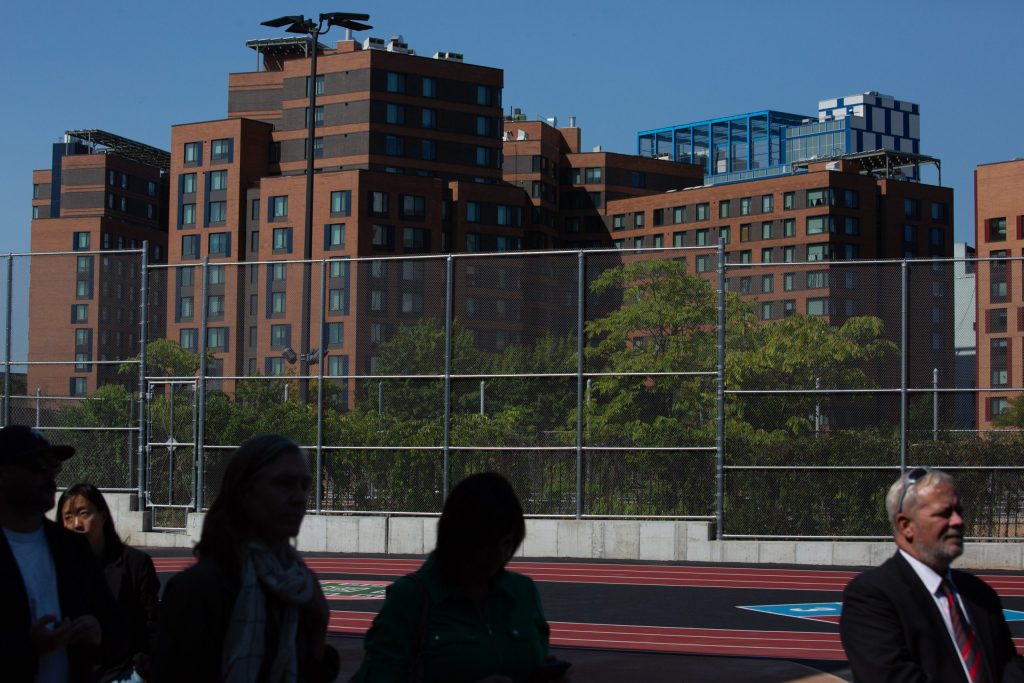Lottery Streamlines Apartment Applications, Cutting Through Bureaucracy for Affordable Housing

Congratulation, you've hit the jackpot with the New York City housing lottery! However, hold your horses: To secure your spot in an affordably priced home, you must sift through piles of documentation to prove your eligibility.
But now, that mountain may look less like the Rockies and more like the Catskills, as the city Department of Housing Preservation and Development is requiring applicants to provide fewer documents.
These modifications are designed to simplify and expedite the rental and sale processes for low-income, subsidized apartments, benefiting both the prospective tenants and property owners.
Candidates who have employment should now furnish just one monthly payslip instead of up to six from before. Currently, only those who are self-employed are required to submit their tax documents.
Before, candidates with less than $5,000 in assets could certify themselves instead of submitting bank statements. Now, this option has been extended to individuals with up to $51,600 in assets. Additionally, these self-certifications—also known as affidavits—are no longer required to have a notary's signature.
Applicants receiving federal benefits, including through the Supplemental Nutrition Assistance Program (SNAP), Temporary Assistance for Needy Families (TANF) or Social Security, won’t need as many documents either. The income determination they get as part of benefits will be enough, allowing them to skip submitting the same information through pay stubs and the like.
Those who have disabilities have more options to verify their eligibility using drivers licenses and school records, specifically when applying for units set aside for people with hearing, vision or mobility disabilities. Before, those applicants had to request that a medical professional complete a form attesting to their disability.
Sam Rosenberg, who leads Reside New York as its executive director—a Brooklyn-based firm that assists developers by screening candidates, conducting interviews, and showing apartments to those entering lotteries—mentions frequently witnessing applicants miss their chance at securing affordable housing due to an inability to collect all necessary paperwork.
When the city simplifies the application process for applicants seeking apartments, making approvals smoother, this will expedite things considerably and truly provide affordable housing options to those who require them," he stated. "Everyone participating will experience a more streamlined procedure.

In the meantime, HPD will waive regulations for one year beginning in May to permit vacant affordable units to be leased or sold. first-come, first-served basis Instead of being part of the city’s lottery system, referred to as Housing Connect, these modifications aim to expedite tenant placement into accommodations while the organization improves the platform used for the lottery process. In 2024, over 10,000 families relocated to affordable homes.
Housing Connect primarily features apartments with subsidies, offering rents lower than market rates. These units are designated for individuals whose incomes fall within specific limits.
City departments are working hard to remove obstacles to housing, which is significant," stated Emily Kurtz, who serves as the lead housing official at RiseBoro Community Partnership, an organization dedicated to providing affordable homes. "Across our sector, we've discussed the substantial effort needed from individuals seeking housing and recognized that lengthy processing times amplify the burden of extensive documentation requirements.
Paper Cut
Ceronne Mitchell, who secured a one-bedroom apartment in Jamaica, Queens for $1,631 per month through an affordable housing lottery, would have valued simpler application processes back in 2023 when she was going through the approval process.
I certainly would have appreciated doing less paperwork," she stated. "It would've been beneficial for me if I didn’t have to gather as many pay stubs.
Although applying for the lottery apartments "was as simple as using a dating app," she explained, the process became more complex once she found out her application had been chosen.
At 26 years old, Mitchell was required to submit six pay stubs, six tax documents, and statements related to her retirement and banking accounts, along with numerous other records. During this period, she held dual roles: one as a manager in social media and another part-time position in retail.
It wasn't particularly challenging, but it was quite tiresome since I had to depend on others for timely document submissions," Mitchell explained. "The entire procedure involved verifying all these funds. It felt like they were meticulously examining my financial situation. I hadn't anticipated just how intrusive the process would be.
Back and forth she went with the leasing agent, fielding queries regarding the co-shared bank account between herself and her mother as well as Apple Pay records indicating periodic transfers from her mom to her. Nervousness plagued her; approval for this new flat meant giving up her part-time work due to an inconvenient travel distance—alongside terminating her present rental agreement.
Over a month later, Mitchell finalized her affordable lease and subsequently relocated into the apartment. her dog Lacey And began equipping her area with used objects to achieve an "Old World Parisian" ambiance as she put it.
I would do it again ten times over," she stated — yet gave some guidance to those who might win in the next housing lottery: "Before they send you an email, make sure you're prepared.
Social services indicate that reducing mandatory documentation will particularly alleviate the strain for previously homeless individuals and those who escaped domestic abuse. driver Regarding homelessness within families in the city.
Over 95 percent of individuals who have survived domestic violence encounter financial abuse, including scenarios where an abuser damages their credit rating, manages their banking activities, or takes out substantial loans using their identity, stated Gabriela Sandoval Requena, the director of policy and communications at New Destiny Housing. This organization assists domestic violence survivors in obtaining stable homes.
She mentioned that numerous survivors lack control over their money, and upon escaping abuse, they often abandon crucial financial documents, particularly tax records.
Not needing those returns for employed applicants 'will greatly assist, particularly for survivors.'
“Abusers might have control over their victims’ income tax details,” Requena stated. “Reducing this burden will aid in quicker housing for survivors.”
Patrick Boyle, who leads the New York branch of Enterprise Community Partners as their senior director, mentioned that it typically requires around 14 months for a newly developed affordable housing project in New York City to become fully occupied with residents.
A significant portion of this involves dealing with cumbersome documentation, such as gathering bank statements and collecting various pieces of information for the tenants to ensure they have everything needed," Boyle explained. "There are numerous individuals who require access to affordable housing—many are burdened by high rents or living in crowded conditions—and the faster we can move these people into stable, affordable homes, the better.
Our non-profit newsroom depends on contributions from readers to maintain our local journalism and ensure it remains accessible to all New Yorkers without charge. Contribute to THE CITY now.
The post Affordable Housing Lottery Cuts Through Bureaucracy for Apartment Applications appeared first on THE METROPOLIS - NYC News .
0 Response to "Lottery Streamlines Apartment Applications, Cutting Through Bureaucracy for Affordable Housing"
Post a Comment